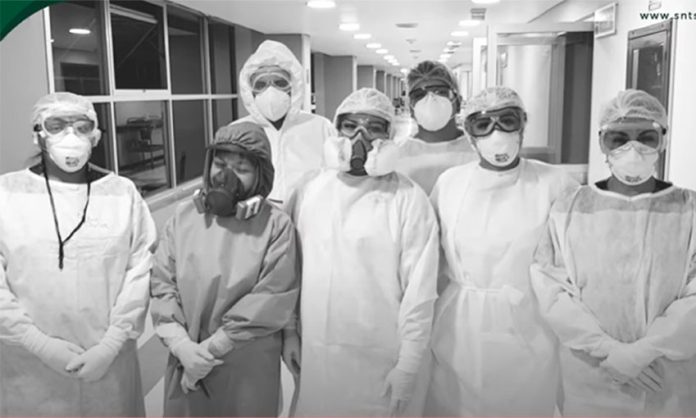“There are few ventilators, intensive care is at its limit, we don’t want to see you here.”
That’s part of a message from doctors and nurses at two Mexico City hospitals who appeared in a video urging people to stay at home to do their bit to stop the transmission of the coronavirus.
The capital, which has recorded almost 340,000 confirmed cases and more than 22,000 Covid-19 deaths, has been Mexico’s coronavirus epicenter since the beginning of the pandemic.
After working for almost a year to treat patients seriously ill with Covid-19, health workers in the capital – and across the country – are both exhausted and traumatized by their pandemic experience, prompting personnel from Mexico City’s IMSS San Juan de Aragón and Tlatelolco general hospitals to make a renewed call for people not to go out.
“Stay at home, stay at home, stay at home,” workers said in unison in the video. “Save our lives, yours and those of others.”

“We’re very tired, we’ve been combatting the coronavirus for 10 months and we don’t see the end of the tunnel. Covid-19 is not a joke, it’s a terrible disease that leads many people to death,” said one female health worker.
“What we’re going through here inside [the hospital] is a painful and cruel war,” said one male employee, while another remarked: “I never thought about living and seeing [such] scenes of terror inside my workplace.”
Another IMSS health worker dressed in full personal protective equipment stares down the barrel of the camera and declares: “Our hospitals are full, there are no more beds.”
Indeed, a Mexico City government report published Monday showed that there are only two general care hospital beds available for coronavirus patients at IMSS hospitals in the capital.
Occupancy across the health system in the capital – where more than 6,300 coronavirus patients are currently hospitalized – is 86% for general care beds and 81% for beds with ventilators, according to federal data. Twenty-eight Mexico City hospitals are currently at 100% capacity for general care beds, while 12 others are at 90% capacity or higher.
In addition, there was a record number of Covid-related calls to the 911 emergency number in Mexico City on Sunday, Mayor Claudia Sheinbaum said Monday.
“There were 560 [calls] yesterday,” she said, adding that 204 resulted in ambulances being sent to people’s homes and that 51 people were transported to hospitals.
Mexico City, currently “maximum” risk red on the federal government’s coronavirus stoplight map, is amidst its worst virus outbreak since the beginning of the pandemic.
A vaccination program is underway in the capital and some other parts of the country but it will be at least several more months – and likely tens of thousands of more deaths – before the country begins to see the light at the end of the dark pandemic tunnel so craved by health workers and the broader citizenry.
To date, 43,960 doses of the Pfizer/BioNTech vaccine have been administered, Deputy Health Minister Hugo López-Gatell said Tuesday morning, highlighting that Mexico ranks 13th in terms of the number of people who have been inoculated against Covid-19.
“The vaccination program began on December 24, we were among the first 1o countries in the world to start vaccinating and the first in Latin America and at this moment we are number 13 in terms of the number of vaccines [administered] … We’re first in Latin America,” he said.
“We have the expectation that we’ll receive more than 53,000 vaccines today,” López-Gatell said, adding that 436,000 doses are scheduled to arrive starting next week.
“Later another two or three vaccines will be incorporated into the repertoire for the objective of a universal and free vaccination program prioritized according to the risk groups.”
The government presented a multi-stage national vaccination plan last month that prioritizes the early inoculation of health workers and the elderly.
López-Gatell announced Monday that the health regulatory agency Cofepris had approved the AstraZeneca/Oxford University Covid-19 vaccine, of which the government has agreed to purchase 77.4 million doses. He said that immunization with that vaccine, which is cheaper than that made by Pfizer and can be transported and stored at regular fridge temperatures, could begin in March.
According to data presented by the deputy minister at President López Obrador’s Tuesday press conference, the United States ranks first for the number of Covid-19 vaccines administered followed by China and Israel. Israel leads on a per capita basis, with 13.5% of the population already having received a shot.
By contrast, only 0.03% of Mexico’s population of approximately 128 million people have received a first dose of the Pfizer/BioNTech vaccine.
Source: Reforma (sp), El Financiero (sp), Milenio (sp), El Universal (sp)
